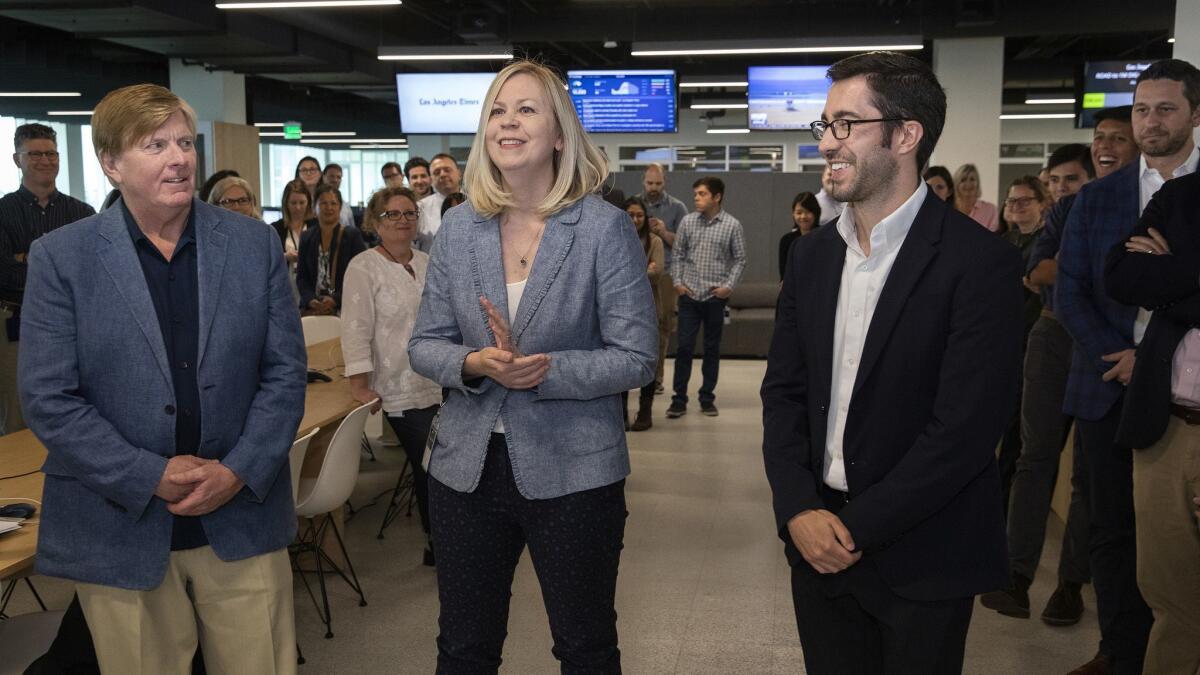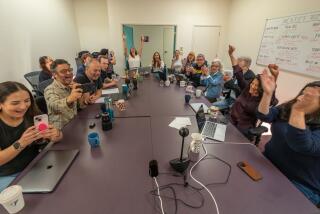Los Angeles Times wins Pulitzer for investigation into former USC gynecologist
- Share via
The Los Angeles Times won the Pulitzer Prize for investigative reporting Monday for its series of stories about a former USC gynecologist accused of sexually abusing hundreds of students during three decades at a campus clinic.
Three investigative reporters with The Times — Harriet Ryan, Matt Hamilton and Paul Pringle — were named by Pulitzer Prize judges. Their reporting began in February 2018 with an anonymous tip about allegations of misconduct against Dr. George Tyndall, who had quietly left the campus clinic where he had practiced for 27 years. The reporters worked three months to track down people who had information about Tyndall, uncovering troubling allegations of abuse of young patients.
The series roiled the prestigious private university, which lies in the heart of Los Angeles, and led to dramatic changes, including the resignation of the university President C.L. Max Nikias. His tenure was marked by an increase in the university’s status and fundraising abilities but tarnished by scandals.
On Monday, the newspaper’s staff had gathered in the center of its seventh-floor newsroom in El Segundo a few minutes before Columbia University announced the winners of the 2019 Pulitzer Prizes. When Ryan, Hamilton and Pringle’s award was announced, the staff erupted in loud and sustained applause.
“I want to take a moment to appreciate the women of USC. They are impressive, they defy stereotypes and they deserved better,” Ryan told the newsroom.
“I am also particularly grateful, and I know my colleagues are, to our sources. People who took risks to talk to us — we couldn’t have done the story without them,” Ryan said. Among the unnamed sources were “a group of women who spoke to us who have low-level jobs and they risked their paychecks and their ability to provide for their families because they wanted the truth to come out and they saw the newspaper as a vehicle for that.”

The award marks the 45th Pulitzer Prize won by The Times since 1942 and comes as the newspaper is undergoing an unprecedented period of rebuilding following its purchase by Dr. Patrick Soon-Shiong in June. The turnaround comes after years of layoffs and management upheaval.
“The award recognizes an extraordinary piece of journalism that continues the Los Angeles Times’ commitment to publishing stories that affect the lives of our readers,” said Norman Pearlstine, The Times’ executive editor. “Through all of the turmoil, over so many years, there was a group of people who remained committed to the Los Angeles Times and committed to creating great journalism that served the public interest.”
Ryan, in her remarks, mentioned the symbolism of accepting one of journalism’s highest honors following a turbulent year when the newsroom was undergoing great strain, including battles with former managers and ownership. The newsroom voted to unionize and the staff was relocated from its historic headquarters in downtown Los Angeles to El Segundo.
“The L.A. Times is going to win many awards over the next 100 years — Pulitzers and everything else,” Ryan said. “I don’t know if any award will ever be as sweet as this one. There are so many people in this building who know that we almost died. There are so many of my colleagues in the newsroom who fought to save the paper.”
Ryan received an anonymous tip in early February 2018 that launched the reporting on the series. The caller refused to provide a name or specific details. Intrigued, Ryan and Hamilton began searching public records for information that might identify Tyndall as a problem doctor. They found nothing. They compiled a list of current and former clinic employees and, along with Pringle, started knocking on doors and asking questions.
The three soon discovered that people had long-standing concerns about the gynecologist but that most were too afraid to share their stories. They feared losing their jobs.
Ryan, Hamilton and Pringle spent months documenting how complaints about Tyndall began in the 1990s, when co-workers alleged that he was improperly photographing students’ genitals during medical exams. Over the years, patients and nursing staff repeatedly accused him of “creepy” behavior, including touching women inappropriately during pelvic exams and making sexually suggestive remarks about their bodies.
The first story, published in May 2018, unleashed a new flood of complaints and within days hundreds of women had come forward with allegations of misconduct.
The series triggered local, state and federal investigations. A task force of police detectives interviewed women across the country, a review that grew into the Los Angeles Police Department’s largest sex crimes investigation of a single suspect. Tyndall has strongly denied any wrongdoing.
More than 650 women filed suit against USC, alleging that the university failed to protect them from sexual abuse. USC last fall agreed to pay $215 million to resolve a federal class-action suit, the first in what is expected to be a wave of settlements.
During the celebration, Managing Editor Scott Kraft praised the commitment to fearless journalism, as well as the primary editors on the series, Shelby Grad and Jack Leonard. The paper’s owners, Soon-Shiong and his wife, Michele Chan, also were in the newsroom to congratulate the team.
The most prestigious journalism Pulitzer, the Gold Medal for public service, went to the South Florida Sun-Sentinel, which exposed the failings of school and law enforcement officials before and after the deadly shooting at Marjory Stoneman Douglas High School in Parkland, Fla. The staff of the Pittsburgh Post-Gazette won for breaking news reporting for its “immersive, compassionate coverage of the massacre at Pittsburgh’s Tree of Life synagogue,” according to the prize judges.
The Chico Enterprise-Record in Northern California, in partnership with the Bay Area News Group, was a finalist in the breaking news category for its coverage of the deadly Camp fire, which destroyed the town of Paradise and killed 85 people. The story was deeply personal for the newspaper’s small staff — many of whom lost homes and waited to learn whether loved ones had survived.
The New York Times was honored for explanatory reporting for an exhaustive 18-month investigation of President Trump’s finances, which debunked his claims of self-made wealth. The Wall Street Journal won for national reporting for uncovering Trump’s hush-money payoffs to adult film star Stormy Daniels and former Playboy model Karen McDougal, during his campaign.
The staff of the Advocate of Baton Rouge, La., was singled out in local reporting for chronicling Louisiana’s discriminatory court system. The international reporting prize went to two organizations: The Associated Press for its yearlong series that detailed atrocities of the war in Yemen; including the deployment of child soldiers; and the staff of Reuters for shedding light on the military units and Buddhist villagers responsible for the systematic murder of Rohingya Muslims from Myanmar, coverage that landed reporters in prison.
Hannah Dreier of ProPublica received the feature writing prize for documenting the experiences of Salvadoran immigrants in New York following a botched federal crackdown on the MS-13 crime group. Tony Messenger of the St. Louis Post-Dispatch won the commentary award; Carlos Lozada of the Washington Post won for criticism; and Brent Staples of the New York Times won for editorial writing.
Pulitzers were also awarded for news and feature photography and in the following arts categories: fiction, non-fiction, drama, history, biography, poetry and music.
More to Read
Inside the business of entertainment
The Wide Shot brings you news, analysis and insights on everything from streaming wars to production — and what it all means for the future.
You may occasionally receive promotional content from the Los Angeles Times.











